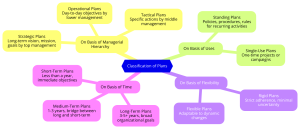Planning and Decision Making

Planning
Concept of Planning
Planning is the process of setting goals, identifying tasks, and determining the resources needed to achieve those goals. It is a systematic approach to problem-solving that involves thinking ahead, anticipating possible challenges, and devising strategies to overcome them. The concept of planning is applicable to a wide range of contexts, including personal, business, and government settings.
Scholars have provided different definitions of planning, but some of the most notable ones include:
- According to Henri Fayol, “To plan means to anticipate the future, to think out and provide for contingencies, to organize means, and to arrange the human and material resources of the enterprise in the best possible manner.”
- George R. Terry defined planning as “the selecting and relating of facts and the making and using of assumptions regarding the future in the visualization and formulation of proposed activities believed necessary to achieve desired results.”
- According to Peter Drucker, “Planning is the continuous process of making present entrepreneurial (risk-taking) decisions systematically and with the best possible knowledge of their futurity, organizing systematically the efforts needed to carry out these decisions, and measuring the results of these decisions against the expectations through organized systematic feedback.”
Effective planning involves several steps, including:
- Defining goals and objectives: Setting clear and specific goals is the first step in planning. Goals should be measurable and achievable, and they should be aligned with the overall mission and vision of the organization or individual.
- Assessing the current situation: Assessing the current situation helps in determining the gap between the current state and desired state.
- Identifying resources: Resources refer to anything that can be used to achieve goals. It includes human, financial, technological resources, and other assets.
- Developing strategies: Developing strategies involves determining the best approach or course of action to achieve the goals. The strategies may vary depending on the goals, available resources, and external factors.
- Implementation: This is the process of executing the plan. During this stage, the plan is put into action.
- Monitoring and evaluation: Monitoring the progress of the plan and evaluating the results helps in determining the effectiveness of the plan and making necessary changes.
Planning is essential for achieving success in any endeavor, as it provides direction, focus, and a clear roadmap for reaching desired outcomes.
Nature/Features of Planning
Planning is a systematic process of setting objectives, determining strategies, and outlining actions to achieve desired goals. It focuses on future outcomes and serves as the foundation for management activities.
Nature/Features of Planning:
-
Primary Function of Management: Planning is the foundation of all management functions. It precedes organizing, staffing, directing, and controlling, as it defines goals and establishes the path to achieve them.
-
Objective Focused: The essence of planning lies in defining clear objectives. It ensures that all efforts and resources are aligned towards achieving specific, measurable, and attainable goals.
-
Intellectual Process: Planning involves critical thinking, analysis, and decision-making. It requires foresight, creativity, and strategic evaluation to formulate effective courses of action.
-
Continuous Process: Planning is an ongoing activity. It adapts to changing circumstances and new information, requiring periodic reviews and adjustments to remain relevant and effective.
-
Related to the Future: Planning is inherently forward-looking. It anticipates future challenges, trends, and opportunities, enabling organizations to prepare for uncertainties and leverage potential benefits.
-
Planning is Pervasive: Planning occurs at all levels of management and across all departments. From strategic corporate plans to individual task plans, it is integral to every organizational layer.
-
Selective Process: Planning is about choosing the best course of action from multiple alternatives. This involves evaluating options and selecting the most efficient and effective strategy to achieve goals.
-
Increased Efficiency: Effective planning optimizes resource utilization and minimizes waste. It ensures that time, effort, and resources are directed toward productive activities, boosting organizational performance.
Planning is a vital, dynamic, and intellectual process that forms the backbone of management. Its future-oriented and pervasive nature ensures organizations are well-prepared to navigate challenges and seize opportunities, ultimately driving efficiency and success.
Rationale (Need) for Planning
Planning is the process of setting goals, developing strategies, and determining the necessary steps to achieve objectives. It provides a structured approach to decision-making and future action to optimize resources and achieve efficiency.
-
Optimal Resource Utilization: Planning ensures that human, physical, financial, and knowledge resources are allocated and used efficiently. It reduces wastage and maximizes the productivity of all organizational resources.
-
Goal Alignment: By clearly defining objectives, planning aligns the efforts of various departments and individuals toward achieving common goals, fostering synergy and unity within the organization.
-
Improved Decision-Making: Planning provides a structured framework for evaluating alternatives and choosing the best options. It reduces uncertainty and equips management with clear guidelines for action.
-
Adaptation to Change: A well-thought-out plan helps organizations anticipate potential challenges and adapt to dynamic environments. It enhances resilience and prepares the organization for future uncertainties.
-
Minimization of Risks: Planning involves forecasting and risk assessment, enabling organizations to identify potential threats and take proactive measures to mitigate them.
-
Enhancing Efficiency: With proper planning, time, effort, and resources are directed toward priority tasks. It eliminates redundancy and ensures that activities contribute meaningfully to organizational objectives.
-
Motivation and Clarity for Employees: Planning provides employees with a clear understanding of their roles and expectations. It boosts morale and motivates them by showcasing how their efforts contribute to the organization’s success.
-
Control and Performance Measurement: Planning sets benchmarks and standards for evaluating performance. It facilitates better control by providing a reference point to compare actual results with expected outcomes.
Planning is essential for achieving organizational efficiency, navigating uncertainties, and optimizing resource utilization. It serves as a foundation for effective management and ensures sustained growth and productivity.
Process of Planning (Step by Steps):
The planning process involves systematically analyzing the environment, setting objectives, developing assumptions, identifying and evaluating alternatives, selecting the best course of action, formulating supportive plans, implementing them, and reviewing to ensure effectiveness.
-
Analysis of Environment:
- Description: The first step involves gathering and analyzing information about internal and external factors that influence organizational operations. This includes economic, political, technological, and social factors.
- Why Needed: Understanding the environment helps identify opportunities and threats, ensuring the plan is realistic and adaptable.
-
Determination of Objectives:
- Description: Objectives define the purpose of the plan and the results to be achieved. They should be specific, measurable, attainable, relevant, and time-bound (SMART).
- Why Needed: Clear objectives guide the direction of planning efforts and ensure alignment with the organization’s vision and mission.
-
Development of Planning Premises:
- Description: This step involves establishing assumptions about future conditions, such as market trends, resource availability, and competitor behavior, which form the basis for planning.
- Why Needed: Premises provide a framework to predict uncertainties and guide consistent decision-making.
-
Identification of Alternatives:
- Description: Different courses of action are identified to achieve the objectives. Creativity and brainstorming are often used to develop a wide range of possible solutions.
- Why Needed: Exploring alternatives increases the likelihood of finding the most effective approach.
-
Evaluation of Alternatives:
- Description: Each alternative is assessed based on criteria like feasibility, cost, benefits, risks, and alignment with objectives.
- Why Needed: Evaluation ensures that the selected plan is practical, efficient, and likely to succeed.
-
Selecting the Best Alternative:
- Description: The most suitable option is chosen after weighing the pros and cons of all alternatives.
- Why Needed: This step ensures resources are directed toward the most viable and effective solution.
-
Formulating Supportive Plans:
- Description: Auxiliary plans, such as resource allocation or contingency plans, are developed to support the main plan.
- Why Needed: Supportive plans address specific aspects, ensuring the smooth execution of the primary plan.
-
Implementation of Plan:
- Description: The chosen plan is put into action by assigning responsibilities, allocating resources, and setting timelines.
- Why Needed: Implementation turns strategies into measurable actions to achieve objectives.
-
Review of the Planning:
- Description: The final step involves monitoring and evaluating the plan’s progress to ensure it meets objectives. Necessary adjustments are made if required.
- Why Needed: Reviewing ensures the plan remains relevant and effective in dynamic conditions.
Advantages/Importance of Planning
Planning is a cornerstone of effective management that brings multiple benefits to individuals and organizations. Below are the key advantages of planning, along with a brief explanation of each:
-
Provides Direction: Planning defines clear objectives and outlines the steps to achieve them. It guides employees and management, ensuring all efforts are aligned toward common goals.
-
Facilitates Decision-Making: By evaluating various alternatives and forecasting outcomes, planning simplifies the decision-making process. It provides a structured framework for selecting the best course of action.
-
Enhances Efficiency: Planning ensures optimal utilization of resources—human, financial, and physical. It minimizes wastage and avoids duplication of efforts, leading to increased productivity and cost-effectiveness.
-
Reduces Uncertainty and Risk: Planning involves anticipating future challenges and preparing for them. It minimizes risks by identifying potential obstacles and devising strategies to mitigate their impact.
-
Promotes Innovation and Creativity: The process of identifying alternatives and evaluating options encourages creative thinking. Planning fosters innovation by challenging traditional approaches and exploring new possibilities.
-
Improves Coordination and Cooperation: Planning harmonizes the activities of various departments and individuals. It aligns their efforts, promoting teamwork and reducing conflicts within the organization.
-
Acts as a Basis for Control: Planning establishes performance standards, enabling management to monitor progress and compare actual outcomes against expectations. It facilitates corrective actions when deviations occur.
-
Helps in Achieving Goals: By defining objectives and breaking them into manageable tasks, planning ensures systematic progress toward achieving organizational goals.
-
Adapts to Change: A well-crafted plan considers dynamic market conditions, allowing organizations to remain flexible and adapt to unforeseen changes in the environment.
-
Boosts Employee Motivation: Planning provides clarity about roles, responsibilities, and expected outcomes. It empowers employees by showing how their work contributes to overall success, enhancing job satisfaction and morale.
- Encourages Resource Allocation: Planning prioritizes tasks and ensures that resources are allocated where they are most needed, avoiding underutilization or overburdening of any resource.
Planning is vital for achieving organizational efficiency, innovation, and adaptability. It not only provides direction and reduces risks but also fosters coordination, motivation, and effective resource utilization. By ensuring proactive management, planning serves as the foundation for sustained growth and success.
Pitfalls/Limitations of Planning
-
Time-Consuming Process: Planning involves gathering data, analyzing options, and formulating strategies, which can consume a significant amount of time. This delay might hinder the organization’s ability to act quickly in situations that demand immediate decisions.
-
Rigidity: Once plans are established, they may restrict flexibility and adaptability. Organizations may find it challenging to adjust plans to unforeseen circumstances or dynamic market conditions, leading to missed opportunities.
-
Costly Process: Planning requires financial investment in research, expert consultations, and resource allocation. For smaller organizations, the costs of extensive planning might outweigh its benefits, making it a burden rather than an asset.
-
Dependence on Accurate Information: Planning is heavily reliant on accurate and up-to-date information. If the data used is incomplete, outdated, or incorrect, the resulting plans can lead to poor decisions and ineffective outcomes.
-
Overemphasis on Predictability: Plans are often based on the assumption of a stable future, which may not align with real-world uncertainties. Over-reliance on predictions can make organizations vulnerable to unexpected disruptions and reduce their ability to react proactively.
-
Stifling Creativity: Strict adherence to plans may discourage employees from thinking innovatively. The focus on predefined strategies can limit brainstorming and out-of-the-box thinking, reducing the organization’s potential for innovation.
-
Resistance to Change: Employees or departments may resist new plans if they perceive them as disruptive, impractical, or conflicting with their current practices. This resistance can slow down the implementation process and create internal conflicts.
-
Uncertainty of Outcomes: Despite thorough planning, external factors like market trends, economic shifts, and competitor actions can impact the success of plans. This unpredictability makes planning less reliable in ensuring desired results.
Types of Plan

1. Classification of Plan on the Basis of Managerial Hierarchy
Meaning: Plans are classified according to the level of management that creates and implements them. It reflects the scope and authority at different levels of the organizational structure.
Types:
- Strategic Plans: Created by top management; they focus on the long-term vision, mission, and goals of the organization.
- Tactical Plans: Developed by middle management to translate strategic plans into specific actions and align departmental activities.
- Operational Plans: Formulated by lower management to handle day-to-day activities and achieve specific operational objectives.
2. Classification of Plan on the Basis of Uses
Meaning: Plans are classified based on how frequently they are used within the organization. Some plans are used repeatedly, while others are used only once for specific projects.
Types:
- Standing Plans: Designed for repeated use, these include policies, procedures, and rules. They provide guidelines for recurring activities.
- Single-Use Plans: Created for one-time projects or activities, such as specific campaigns or initiatives.
3. Classification of Plan on the Basis of Flexibility
Meaning: Plans are categorized based on their adaptability to changing circumstances and the level of rigidity in their application.
Types:
- Rigid Plans: Fixed plans that are strictly adhered to without changes, often used in situations with minimal uncertainty.
- Flexible Plans: Adaptable plans that can be modified in response to dynamic changes in the environment or organizational needs.
4. Classification of Plan on the Basis of Time
Meaning: Plans are classified based on their time horizon, indicating whether they focus on short-term, medium-term, or long-term objectives.
Types:
- Long-Term Plans: Typically span 3-5 years or more; they address broad organizational goals and strategies.
- Medium-Term Plans: Cover a time frame of 1-3 years, acting as a bridge between long-term and short-term plans.
- Short-Term Plans: Focus on immediate objectives, often covering a time frame of less than one year.
These classifications ensure clarity, consistency, and efficiency in planning processes across organizations.
Decision Making
Meaning of Decision Making
Decision making is the cognitive process of selecting the best course of action from multiple alternatives to achieve a desired outcome. It is a fundamental function in personal, organizational, and societal contexts, involving both rational analysis and intuitive judgment.
Scholars have provided several definitions of decision making. According to Simon (1977), decision making is “the process of identifying and choosing alternatives based on the values and preferences of the decision-maker.” Robbins and Judge (2019) further describe it as “a choice made from two or more alternatives to solve a problem or capitalize on opportunities.”
The process typically involves recognizing a problem, gathering relevant information, evaluating options, and selecting the most suitable action. Effective decision making is essential for achieving objectives and minimizing risks. It can be influenced by factors such as cognitive biases, emotional intelligence, and organizational culture, highlighting its complexity and multidimensional nature.
Nature/Features of Decision Making
-
Goal-Oriented Process: Decision making is inherently focused on achieving specific objectives or resolving problems. Every decision is directed toward fulfilling an individual or organizational goal.
-
Dynamic and Continuous: Decision making is not a one-time event; it is an ongoing process that adapts to changing situations, new information, and evolving goals.
-
Choice Among Alternatives: It involves analyzing and selecting the best option from a set of alternatives, ensuring the chosen path aligns with desired outcomes.
-
Pervasive Function: Decision making occurs at all levels of an organization, from strategic decisions made by top management to routine decisions at operational levels.
-
Influenced by External and Internal Factors: Decisions are shaped by internal factors (resources, organizational culture) and external factors (economic, social, and technological changes).
-
Rational and Emotional: While decisions are often guided by logical analysis, emotions and intuition also play significant roles, especially in complex or ambiguous situations.
-
Risk and Uncertainty: Decision making inherently involves some degree of risk and uncertainty, as outcomes cannot always be predicted with complete accuracy.
-
Essential for Management: Decision making is central to management functions like planning, organizing, leading, and controlling, making it a critical skill for leaders and managers.
These features highlight the multifaceted and adaptive nature of decision making in various contexts.
Importance of Decision Making
Decision-making is the backbone of any successful business. It is the process of selecting the best course of action from multiple alternatives to achieve specific goals. In the fast-paced and competitive world of business, the ability to make effective decisions is crucial for growth, sustainability, and success. This article explores why decision-making is so important in business and how it impacts organizations, employees, and customers.
- Drives Business Growth and Innovation: Every business aims to grow and stay ahead of its competitors. Decision-making plays a key role in identifying opportunities for expansion, investing in new technologies, and launching innovative products or services. For example, a company deciding to enter a new market or adopt sustainable practices can significantly boost its growth and reputation.
-
Ensures Efficient Resource Management: Businesses operate with limited resources such as time, money, and manpower. Effective decision-making helps allocate these resources wisely. For instance, deciding how to budget funds, which projects to prioritize, or how to streamline operations can maximize efficiency and reduce waste.
-
Enhances Problem-Solving Abilities: In business, challenges and uncertainties are inevitable. Whether it’s a drop in sales, a supply chain disruption, or a PR crisis, decision-making enables businesses to address problems quickly and effectively. Leaders who can analyze situations, weigh options, and make informed decisions are better equipped to navigate obstacles.
-
Builds a Competitive Advantage: In a competitive market, businesses must make strategic decisions to stand out. For example, deciding to focus on customer service, offer unique products, or adopt cutting-edge technology can give a company an edge over its competitors. Good decision-making helps businesses stay relevant and appealing to their target audience.
-
Impacts Employee Morale and Productivity: Decisions made by business leaders directly affect employees. For example, decisions about workplace policies, training programs, or recognition systems can influence employee satisfaction and productivity. When employees feel valued and supported, they are more likely to contribute positively to the organization.
-
Ensures Customer Satisfaction: Customers are the lifeblood of any business. Decisions related to product quality, pricing, and customer service directly impact customer satisfaction. For instance, a decision to improve after-sales support or offer personalized experiences can build customer loyalty and drive repeat business.
-
Mitigates Risks: Every business decision involves some level of risk. Effective decision-making involves assessing potential risks and taking steps to minimize them. For example, a company might decide to diversify its product line to reduce dependence on a single revenue source or invest in cybersecurity to protect sensitive data.
-
Supports Long-Term Vision and Goals: Businesses need a clear vision and long-term goals to succeed. Decision-making ensures that daily operations align with these goals. For example, a company focused on sustainability might decide to reduce its carbon footprint by switching to renewable energy sources. Such decisions help businesses stay true to their mission and values.
Types of Managerial Decisions
Decision-making is a fundamental process in both personal and professional life. It involves choosing the best course of action from multiple alternatives to achieve a desired outcome. Decisions can be categorized in various ways, but one useful approach is to classify them according to time, importance, and coverage. This article explores these categories in detail, helping you understand how decisions are made and their impact on individuals and organizations.
1. Decisions Based on Time
Time is a critical factor in decision-making. Decisions can be classified based on whether they are short-term, medium-term, or long-term.
a) Short-Term Decisions: These are immediate decisions that focus on the present or near future. They are often routine and operational in nature.
-
Examples: Scheduling daily tasks, managing inventory, or handling customer inquiries.
-
Importance: Short-term decisions ensure the smooth functioning of day-to-day activities and help maintain efficiency.
b) Medium-Term Decisions: These decisions cover a period of weeks, months, or a few years. They are often tactical and involve implementing strategies.
-
Examples: Planning a marketing campaign, setting quarterly budgets, or hiring new employees.
-
Importance: Medium-term decisions bridge the gap between short-term operations and long-term goals, ensuring progress toward broader objectives.
c) Long-Term Decisions: These decisions have a far-reaching impact and shape the future of an individual or organization. They are strategic and require careful planning.
-
Examples: Expanding into new markets, investing in research and development, or setting a company’s mission and vision.
-
Importance: Long-term decisions define the direction and success of an organization over time.
2. Decisions Based on Importance
The importance of a decision refers to its significance and the consequences it carries. Decisions can be categorized as routine, significant, or critical.
a) Routine Decisions: These are low-stakes, everyday decisions that are often repetitive and follow established procedures.
-
Examples: Approving employee leave requests, ordering office supplies, or processing routine paperwork.
-
Importance: Routine decisions keep operations running smoothly but require minimal managerial attention.
b) Significant Decisions: These decisions have a moderate impact and require more thought and analysis. They often involve allocating resources or solving problems.
-
Examples: Choosing a vendor for a project, launching a new product, or reorganizing a department.
-
Importance: Significant decisions influence the efficiency and effectiveness of an organization.
c) Critical Decisions: These are high-stakes decisions that can have a major impact on the future of an individual or organization. They often involve uncertainty and risk.
-
Examples: Deciding to merge with another company, responding to a major crisis, or making large-scale investments.
-
Importance: Critical decisions shape the long-term success and survival of an organization.
3. Decisions Based on Coverage
Coverage refers to the scope or range of a decision. Decisions can be personal, organizational, or societal.
a) Personal Decisions: These decisions are made by individuals and affect their personal lives. They reflect personal values, preferences, and goals.
-
Examples: Choosing a career path, deciding where to live, or managing personal finances.
-
Importance: Personal decisions shape an individual’s life and future.
b) Organizational Decisions: These decisions are made within a business or organization and impact its operations, employees, and stakeholders.
-
Examples: Setting company policies, allocating budgets, or launching new initiatives.
-
Importance: Organizational decisions determine the success and sustainability of a business.
c) Societal Decisions: These decisions have a broader impact and affect communities, societies, or even the world. They often involve ethical considerations and social responsibility.
-
Examples: Implementing environmental policies, addressing social inequality, or supporting global initiatives.
-
Importance: Societal decisions contribute to the well-being of communities and the planet.
Decision-Making Conditions.
Decision-making conditions refer to the level of information available to a decision-maker when making a choice. These conditions are categorized into three types: certainty, risk, and uncertainty.
-
Certainty:
-
In this condition, the decision-maker has complete and accurate information about the outcomes of each alternative.
-
There is no ambiguity, and the results of decisions are predictable.
-
Example: A manager knows exactly how much profit a product will generate based on historical sales data.
-
-
Risk:
-
Here, the decision-maker has some information but cannot predict outcomes with certainty. Probabilities can be assigned to possible outcomes.
-
Decisions involve calculated risks based on available data.
-
Example: Launching a new product with a 70% chance of success based on market research.
-
-
Uncertainty:
-
In this condition, the decision-maker lacks sufficient information to predict outcomes or assign probabilities.
-
Decisions are made under ambiguity, often relying on intuition or judgment.
-
Example: Entering a completely new market with no prior data or experience.
-
Understanding these conditions helps decision-makers choose appropriate strategies and tools to navigate challenges effectively.
Decision-Making Process
For management students, understanding the decision-making process is essential, as it forms the foundation of effective leadership and organizational success. This article breaks down the decision-making process into six key steps, providing a clear roadmap for making informed and effective decisions.
1. Problem Identification: The first step in the decision-making process is recognizing and defining the problem. A clear understanding of the issue is crucial because it sets the stage for all subsequent steps.
-
What to do: Ask questions like, What is the problem? Why is it a problem? Who is affected by it?
-
Example: A company notices a decline in sales. The problem is identified as a lack of customer engagement.
2. Collecting and Analyzing Information: Once the problem is identified, the next step is to gather relevant information and analyze it. This helps in understanding the root cause of the problem and provides a basis for generating solutions.
-
What to do: Use tools like surveys, data analysis, and market research to collect information.
-
Example: The company analyzes customer feedback and sales data to understand why engagement is low.
3. Generating Possible Alternatives: With a clear understanding of the problem and the necessary information, the next step is to brainstorm possible solutions. Creativity and collaboration are key in this stage.
-
What to do: Encourage team discussions, use brainstorming techniques, and consider all possible options.
-
Example: The company considers alternatives like launching a new marketing campaign, improving product quality, or offering discounts.
4. Choosing the Best Alternative: After generating alternatives, the decision-maker must evaluate each option based on criteria such as feasibility, cost, and potential impact. The goal is to select the best alternative that aligns with the organization’s goals.
-
What to do: Use decision-making tools like SWOT analysis, cost-benefit analysis, or a decision matrix.
-
Example: The company decides to launch a new marketing campaign because it is cost-effective and has the potential to reach a wider audience.
5. Implementation: Once the best alternative is chosen, the next step is to put the decision into action. This involves planning, allocating resources, and assigning responsibilities.
-
What to do: Create an action plan, set timelines, and communicate the plan to all stakeholders.
-
Example: The company develops a detailed marketing plan, allocates a budget, and assigns a team to execute the campaign.
6. Feedback: The final step in the decision-making process is to monitor the outcomes and gather feedback. This helps in evaluating the effectiveness of the decision and making necessary adjustments.
-
What to do: Use performance metrics, surveys, and feedback from stakeholders to assess results.
-
Example: The company tracks sales data and customer feedback after the campaign to determine if it successfully increased engagement.
The decision-making process is a structured approach that helps individuals and organizations make informed and effective choices. By following the six steps—problem identification, collecting and analyzing information, generating alternatives, choosing the best alternative, implementation, and feedback—you can tackle challenges with confidence and achieve desired outcomes.


